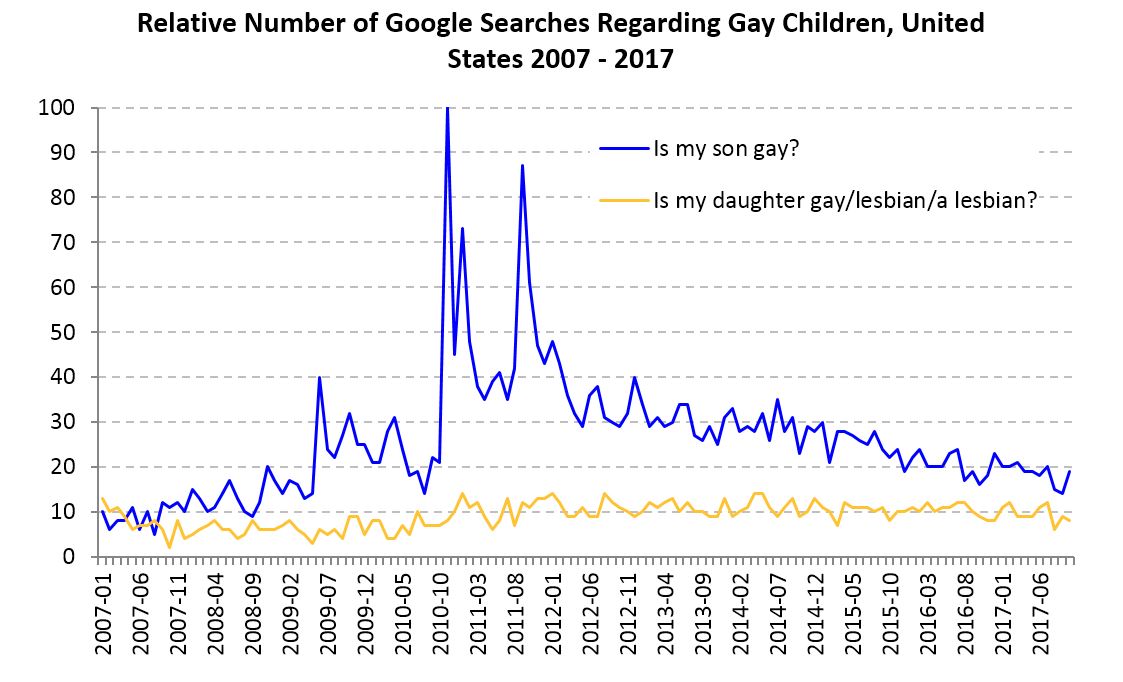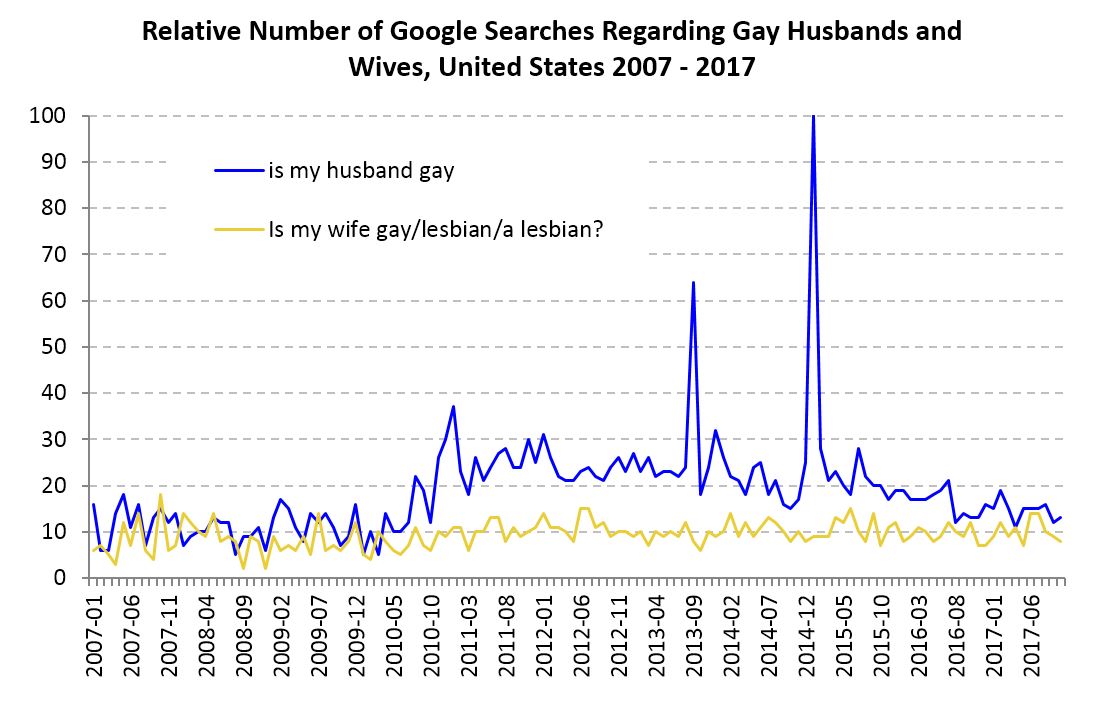
What are worried parents and spouses searching for? / Photo Flickr CC https://flic.kr/p/avxjtF
Google searches show more worry over gay men and boys than over gay women and girls
A 2014 New York Times story called “Google, Tell me. Is My Son a Genius?” reported that people ask Google whether their sons are “gifted” at a rate 2.5 times higher than they do for their daughters. It also found that people ask Google whether their daughter is “overweight” much more than they do for their sons. In general, Google searches about sons were more likely to be about intellect, stupidity and leadership, while Google searches for daughters were more likely to be about looks (i.e., whether their daughter is “beautiful” or “ugly”).
Building off this article, Tristan Bridges wrote a 2017 post called “Google, Tell Me. Is My Son Gay?,” in which he also analyzed Google Trends but instead looked at how common Google searches were for “Is my son gay?” and “Is my daughter gay?” and compared them to searches for “Is my son gifted?” He found that people were much more likely to ask about children’s sexualities than any other quality mentioned in the New York Times piece. Specifically, he found that searches for “Is my son gay?” were 28 times more common than searches for “Is my son gifted?” He also found that there was a large gender disparity in asking Google about gay children; people asked Google, “Is my son gay?” 4.7 times more than “Is my daughter gay?”
We extend what Bridges did to include more search terms, and to include concerns of whether people’s husbands or wives are gay as well.
We wondered if Bridges’ finding could be an artifact of the fact that searches about whether daughters were gay might be distributed across three potential wordings: asking whether the daughter is “gay,” “lesbian,” or “a lesbian.” In addition, we were interested in knowing how these results would look if restricted to searches in the United States. Thus, we repeated the analysis using all three phrases, “Is my daughter gay?” “Is my daughter lesbian?” and “Is my daughter a lesbian?” We combined their results to compare to “Is my son gay?” As shown below, we found that all three phrases combined are still less likely searches than “Is my son gay?” over the 2007-2017 period in the United States.
Notes: The gold line adds the monthly relative importance of “is my daughter gay,” “is my daughter lesbian,” and “is my daughter a lesbian.” Google measures trends monthly. Each point in the graph represents the search interest relative to the highest point on the chart, corresponding to the United States in the 2007-2017 period. A value of 100 is the peak popularity for a term across this period. A value of 50 means that the term is half as popular, relative to the peak, and a score of 0 means the term was less than 1% as popular as the peak.
We find that, after combining the three possible phrases for daughters (“Is my daughter gay/lesbian/a lesbian?”), Google searches for “Is my son gay?” are still about twice as common in July 2017, and they were about 5 times more common in January 2011, shortly after the movie Oy Vey! My Son is Gay was released. Our analysis confirms that parental concern for gay sons is much higher than for gay daughters when restricting searches to the United States, and even after combining all three possible search term phrases for daughters.
Next, we extend our Google search analysis from gay sons and daughters to analysis of Google searches for gay husbands or wives. Below, we analyze Google Trends comparing searches for “Is my husband gay?” to “Is my wife gay?”, “Is my wife lesbian?”, and “Is my wife a lesbian?” for the same period in the United States.
Notes: The gold line adds the monthly relative importance of “is my wife gay,” “is my wife lesbian,” and “is my wife a lesbian.” Google measures trends monthly. Each point in the graph represents the search interest relative to the highest point on the chart, corresponding to the United States in the 2007-2017 period. A value of 100 is the peak popularity for a term across this period. A value of 50 means that the term is half as popular, relative to the peak, and a score of 0 means the term was less than 1% as popular as the peak.
Similar to the findings on gay children, we see that after combining the three possible phrases for wives (“Is my wife gay/lesbian/a lesbian?”), Google searches for “Is my husband gay?” were about twice as common in July 2017, and up to 11 times higher in January 2015, when the show “My Husband is Not Gay” premiered on the television network TLC.
Overall, our analyses provide further evidence that concern for gay sons and husbands is much higher than for gay daughters and wives in the last decade in the United States. After combining all three search term phrases, we find that Google searching “Is my son gay?” was, on average, twice as common than Google searches for gay/lesbian daughters in this period, and Google searching “Is my husband gay?” was, on average, about 3 times more common than Google searches for gay/lesbian wives in the same period.
As Bridges notes, interpreting Google searches does not necessarily tell us why people are searching these phrases; parents and partners could be searching these phrases because they are open to their child’s or partner’s sexual diversity and they want to help, or simply learn more. However, we strongly suspect that the higher rates of searches about a son or husband being gay reflect that being a gay male is seen more negatively than being a lesbian. This interpretation is consistent with other research showing that departures from exclusive heterosexuality— or even perceived departures from exclusive heterosexuality— are more stigmatizing for men than women. Less concern about women’s and girls’ involvement in non-heterosexual activities and sexualities is also consistent with the steeper increases across birth cohorts in sex with same-sex partners that we find among women compared to men in the United States. We believe these findings are a consequence of two factors combined: society’s devaluation of anything seen as “feminine,” coupled with the fact that same-sex sex is often seen as gender-bending, means that engaging in same-sex sexual behavior is more costly and threatening for men’s and boys’ social status than for women’s and girls’ social status.
Methodological Note
The relative search interest trends that we show were calculated by Google Trends, and correspond to an unbiased subsample of Google searches. The search results of interest are divided by the total searches in the United States during the corresponding time period. Then, they are scaled on a range of 0 to 100 based on the percentage that the search of interest represents, relative to all searches on all topics. We restrict the period observed to the last decade, 2007-2017, because it was not until 2007 that Google had the majority (more than 50%) of the search engine market in the United States. Thus, it is more reasonable to assume that data for the most recent decade capture a more accurate depiction of search engine behavior of the American public.
Emma Mishel is a doctoral student in the sociology program at New York University. Mónica L. Caudillo is a Postdoctoral Associate at the Maryland Population Research Center at the University of Maryland.



Comments 4
Nina Lasek
November 17, 2017Hi,
this is an interesting analysis. However, notice that on august 29, 2009 (Montreal World Film Festival) respectively on december 24, 2010 the movie "Oh vey! My Son is gay" was released (see https://en.wikipedia.org/wiki/Oy_Vey!_My_Son_Is_Gay!!). It thus seems plausible that the peaks in the first part of the analysis might have been driven by google searches for a specific movie, but not by peoples' concerns regarding the sexual orientation of their children. I am not sure if and to what extent this alternative mechanism compromises the authors main conclusions -
jacsmskkthf
July 19, 2020into this issue and tired to tinker around to check if its possible but couldnt get it done. Now that i have se https://kodi.software/ en the way you did it, thanks guys
with
regards
jacsmskk
July 19, 2020I was into this issue and tired to tinker around to check if its possible but couldnt get it done. Now that i have s kodi.software een the way you did it, thanks guys
with
regards
Travis isom
August 22, 2020This is not the only for USA, but most of the countries in the world.There are many people around the world want to search these term via Google. vr fuck dolls